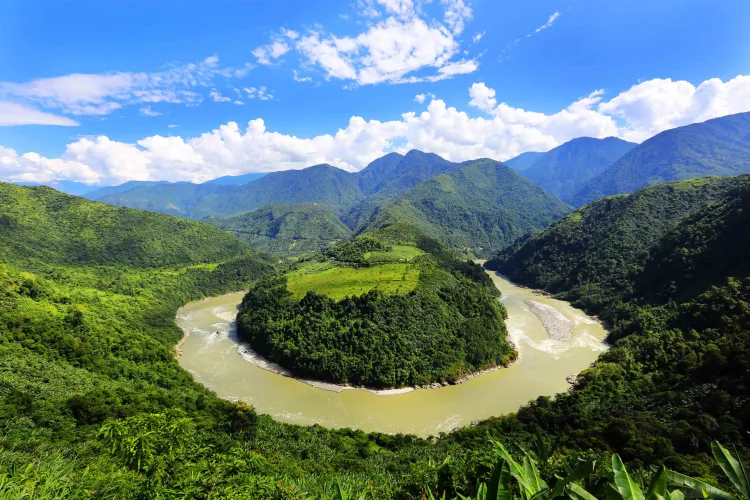What Are the Enormous Consequences of China's Medog Hydropower Dam Project?

Synopsis
Key Takeaways
- China's Medog project poses significant environmental risks.
- Potential for catastrophic floods and droughts in India and Bangladesh.
- Geopolitical tensions may escalate due to water insecurity.
- UK's role is crucial in addressing the Himalayan water crisis.
- International cooperation is essential for sustainable solutions.
Washington, Aug 13 (NationPress) Despite facing multiple natural disasters, China's “water-industrial complex” relentlessly pursues the establishment of hydropower dams in ecologically and politically sensitive regions of the Tibetan plateau, according to a report released on Wednesday highlighting Beijing's ambitious Medog Hydropower Station project on the Yarlung Tsangpo River in Tibet.
The dam is located near Arunachal Pradesh in India, indicating that this issue transcends mere environmental concerns, evolving into a geopolitical flashpoint, as reported by a Washington-based online publication.
"Beijing has initiated construction of the world’s largest dam in Tibet, the Medog project on the Yarlung Tsangpo, which represents a monumental engineering achievement if completed. However, without any prior consultation or a water-sharing agreement, China now has control over the lifeline of northeast India and parts of Bangladesh. This river, known as the Brahmaputra in India and the Jamuna in Bangladesh, sustains millions of livelihoods," stated The National Interest (TNI) in their report.
In addition to India and Bangladesh, several downstream countries including Thailand, Nepal, Pakistan, and Vietnam are expected to be affected by China's expanding influence over the Tibetan Plateau and its aggressive dam development initiatives in the region, as detailed by Jagannath Panda, a prominent expert on Indo-Pacific affairs, and Shruti Kapil, head of the Security and Mutual Dependence Desk at London's International Centre for Sustainability (ICfS), in their report titled 'How the UK Can Help the Himalayan Water Crisis'.
"The potential consequences of this dam are vast. Sudden water releases during the monsoon season could lead to catastrophic floods in India’s northeast. Conversely, upstream control in dry seasons may result in crippling droughts. Considering the dam's location in a highly seismic area and its proximity to Arunachal Pradesh, it’s evident that this situation is not merely an environmental issue but rather a significant geopolitical flashpoint," the report highlighted.
The report urged the United Kingdom, a permanent member of the United Nations Security Council (UNSC), to acknowledge the Himalayan water crisis as an impending threat to global security, especially as climate change alters the geopolitical landscape. Given its renewed ambitions in the Indo-Pacific, Britain is "uniquely positioned" to elevate the issue of Himalayan ecological degradation to a global priority, the report emphasized.
"Melting glaciers, climate-induced variability, and unregulated dam construction in the Himalayas are endangering millions of lives across South and Southeast Asia. This pressing matter should not be overlooked in Westminster, particularly as the UK has been a traditional stakeholder and a historical actor in the Himalayas," the report articulated.
The National Interest report indicated that while the Himalayan region possesses the largest reserves of freshwater and its glaciers supply ten of the world’s most critical river systems, it continues to face severe threats.
"Climate change is accelerating glacial melt at an alarming rate, disrupting monsoon patterns, and increasing the frequency of extreme weather events. Consequently, the region is experiencing water stress, food insecurity, and heightened geopolitical tensions, particularly between India and China," the report noted.
Water insecurity in the Himalayas poses a direct threat to the stability of the Indo-Pacific, an area that the UK has consistently identified as central to its future economic and security interests. The 2021 Integrated Review and its subsequent updates have underscored the significance of a free and open Indo-Pacific; however, the UK's vision is undermined without stability in the Himalayas, the report stated.
"Furthermore, the UK has a long-established commitment to maintaining a rules-based international order. China’s opaque and unilateral approach to managing transboundary rivers in the Himalayas directly contravenes that principle. The weaponization of water, as is currently being observed, sets a dangerous precedent not just in Asia but globally," wrote Panda and Kapil.









